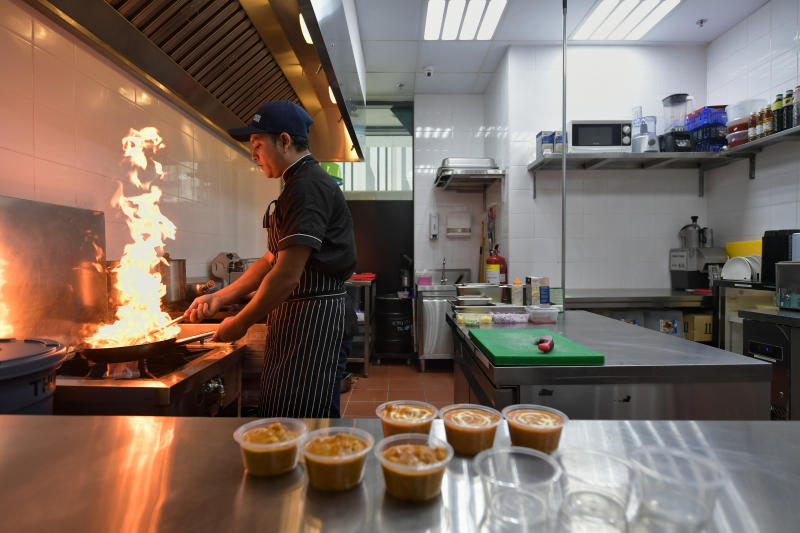Competition watchdog investigating online food delivery and virtual kitchen sectors
Sign up now: Get ST's newsletters delivered to your inbox

A photo taken on April 23, 2018, shows the Deliveroo Editions kitchen in Lavender. A shared kitchen operator lodged a complaint with the Competition and Consumer Commission of Singapore in July that it had been shut out by Deliveroo and GrabFood.
PHOTO: ST FILE
SINGAPORE - Singapore's competition watchdog has commenced investigations into the online food delivery and virtual kitchen sectors, following a shared kitchen operator's complaint that it had been shut out by Deliveroo and GrabFood.
In question is whether food and beverage businesses renting kitchen space for delivery operations are being prevented from using the delivery services of their landlords' competitors, thereby limiting their reach.
This comes after Smart City Kitchens lodged a complaint with the Competition and Consumer Commission of Singapore (CCCS) in July when its tenants found themselves blocked from being listed on two of the three major food delivery services here, shortly after starting business.
The "ghost kitchen" operator linked to ousted Uber chief executive Travis Kalanick opened a 13,000 sq ft facility in Tampines in June, touting itself as the first operator here to be unaffiliated with a delivery service.
It houses 30 individual kitchens that are rented out to food and beverage operators for delivery operations, but restaurants must find their own platforms for sale and delivery.
Tenants of Smart City Kitchens told The Straits Times in July that Deliveroo and GrabFood, which had initially agreed to list them on their respective apps, later changed their mind. They cited the eateries' landlord, Smart City Kitchens as the reason. While they are listed on foodpanda, being blocked from the two other major players' services limits their reach, they said.
The CCCS said then that it was looking into the issue. In an update on Friday (Oct 11), it said that it has begun investigations, prompted by industry feedback.
It will focus on conduct involving the use of exclusive agreements which prevent F&B tenants of virtual kitchens from using the online food delivery services of competitors, as well as the refusal to supply delivery service to tenants of kitchens run or owned by competitors.
"Third-party feedback indicated that it is important for F&B businesses to have access to multiple online food delivery services in order to reach a wider consumer base," it said, adding that the kitchens can serve as a testbed for entrepreneurs while also benefiting consumers.
Deliveroo and foodpanda both operate their own shared kitchens, which allow businesses to expand or create new brands without the costs of a dine-in space. Such facilities also enable users of food delivery services to order from multiple eateries at once.
GrabFood operates shared kitchens in Indonesia, and has announced plans to expand this concept to other countries in the region, including Singapore.
It launched a feature in August that allows users of its service to order pre-made dishes from popular hawker stalls, which are stored in warmers at five "Hawker Hubs" that it operates across the island for delivery.
Smart City Kitchens' general manager Warren Tseng said in response to news of the investigation that the firm "remains confident that the CCCS will take the appropriate measures to promote fair and healthy competition between start-ups and businesses in Singapore to the benefit of its consumers".
The Straits Times has contacted Deliveroo and GrabFood for comment.
Industry players and other interested parties with concerns or relevant information are advised to assist the CCCS in its investigation by emailing cccs_feedback@cccs.gov.sg.


